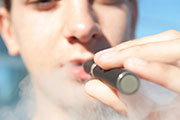July 11, 2014


Latest Lungs News
THURSDAY, July 10, 2014 (HealthDay News) — Governments should ban or limit the use of electronic cigarettes until more is known about their health effects, say experts from the world’s leading lung organizations.
The position statement was issued Wednesday by the Forum of International Respiratory Societies (FIRS), which includes more than 70,000 members worldwide.
“The gravity of tobacco use on global health and the historical behavior of the tobacco industry that has included deceit about the health effects of tobacco, intentional marketing to children and manipulating nicotine levels in cigarettes to maintain addiction should prompt us to proceed cautiously,” statement author Dr. Dean Schraufnagel, past president of the American Thoracic Society, said in a society news release.
“Nicotine is central to lifelong addiction, and [e-cigarettes] are nicotine-delivery devices,” he added.
The safety of e-cigarettes has not been confirmed, nor have their potential benefits, such as helping people quit smoking, according to the statement. It also warned about the addictive power of nicotine and the possible risk that e-cigarette emissions pose to nonusers.
All health and safety claims about e-cigarettes should be supported by scientific evidence, the statement recommended. And if governments permit the use of e-cigarettes, the devices should be regulated as medicines or as tobacco products.
The statement also said that research on e-cigarettes should be supported by sources other than tobacco companies and e-cigarette makers, and all findings should be made public and presented in easy-to-understand language.
In April, the U.S. Food and Drug Administration proposed long-awaited regulations governing the fast-growing electronic cigarette industry.
The new rules would give the FDA the authority to regulate e-cigarettes as tobacco products, placing them under the same requirements as cigarettes. That would include a ban on the sale to minors.
— Robert Preidt
 Copyright © 2014 HealthDay. All rights reserved.
Copyright © 2014 HealthDay. All rights reserved.
SOURCE: American Thoracic Society, news release, July 9, 2014
![]()